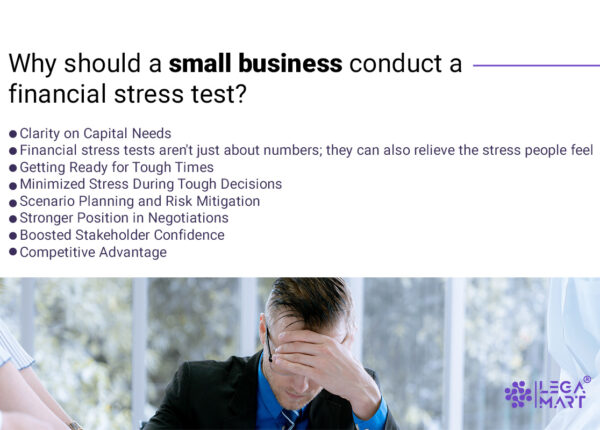Introduction
“Nev Harris is an expert in speaking and marketing, and he helps entrepreneurs get a better grip on their business finances. He suggests that if you’re a business owner dealing with business financial challenges, it’s a good idea to perform a ‘business stress test.’ This means taking a close look at your company’s finances to understand how things are going, manage your cash flow, and be ready for the worst-case scenario. Doing this helps you determine which expenses are most important and gives you peace of mind that you’re ready for whatever comes your way.
Business leaders can assess how well their companies would do in challenging financial situations using a ‘financial stress test.’ This is a way for business owners to check how their companies would perform in difficult financial situations, like facing new competition, a recession, or even a natural disaster. Simply put, it’s a method to predict the worst possible situation before it happens. It’s beneficial during uncertain times, like inflation, because it helps you figure out and prepare for tough times. The main benefit is that it lets you plan for the future, so you don’t have to wait until your business is in trouble.
A financial stress test is driven by two critical questions:
- Do you have enough money to survive a difficult period that could last up to two years?
- Are there any potential problems on the horizon that could harm your income?
Why should a small business conduct a financial stress test?

Small businesses should perform financial stress tests to strengthen their ability to handle financial challenges and uncertainties. Some of the benefits of financial stress testing to small businesses include: –
Clarity on Capital Needs: Stress tests provide a clear picture of the company’s short to medium-term capital requirements. This means the business knows how much money it might need to keep operations running smoothly, even during challenging times.
Financial stress tests aren’t just about numbers; they can also relieve the stress people feel: Do not underestimate the impact of a financial stress test on your mindset and on those who rely on your business. Generally, financial stress tests can reduce anxiety among stakeholders, including owners, employees, suppliers, and customers. Knowing that the business can survive even in a worst-case scenario allows everyone to focus on weathering the storm safely and maintaining the business’s strength and health.
Getting Ready for Tough Times: In times of uncertainty, one of the smartest moves you can make while bracing for difficulties is to build a strong financial cushion. Certainly, you can reduce costs and consistently add to your savings, but it’s also wise to secure a business loan or a line of credit before you’re in desperate need. Apply for financial support when your business is in good shape because waiting until you’re desperate can make it harder to get the assistance you need. Establish an emergency fund to rely on when your cash flow dries up or when times become especially tough. This kind of financial readiness can make a significant difference when you face economic challenges
Minimized Stress During Tough Decisions: When difficult decisions must be made, a business that has undergone stress testing is better equipped to handle the pressure. It minimizes the stress and uncertainty surrounding these choices, making them more manageable.
Scenario Planning and Risk Mitigation: Stress tests prompt a business to consider ‘what if’ scenarios. By exploring potential challenges and opportunities, the company can develop strategies to minimize risks and maximize advantages. It’s like having a playbook for different situations, which helps the business stay proactive.
Stronger Position in Negotiations: When a business shows it’s well-prepared through stress testing, it gains leverage when negotiating with financiers. It demonstrates to lenders or investors that the business can handle challenges and is a reliable investment. It’s like walking into negotiations with a firm hand.
Boosted Stakeholder Confidence: Key stakeholders, including owners, employees, suppliers, and customers, gain confidence in the business when they see that it’s equipped to handle various scenarios. This trust can be vital during turbulent times, as stakeholders believe in the business’s resilience.
Competitive Advantage: Ultimately, stress testing provides a competitive edge. It gives management an advantage over competitors who might not be as prepared. It’s like being ahead in a race, as the business is more adaptable, strategic, and resilient in a changing market.
How Can Small Businesses Conduct a Financial Stress Test?
Think of it like evaluating how well your company is doing, much like how you would assess an employee’s performance to see how they contribute to the business. Identify the areas that need improvement and those already making a positive impact. Then, figure out what you can do to improve the situation further.
Nev Harris suggests a practical method, which includes creating a spreadsheet with three columns:
- First column: List all the money you expect to earn in the next year, like your regular income.
- Second column: List all the expenses you anticipate for the same period.
- Third column: Sum up the money people owe you (accounts receivable) and what’s currently in your business bank account.
Now, add up the totals in each column. Subtract your expenses (from column 2) from your expected income (in column 1) to see if your business can cover its costs with the money you anticipate receiving. If the result is positive, your finances are in good shape for now. If it’s negative, you can use the money in column 3 to try to turn that negative into a positive. But in the long run, you might need to take more steps to improve your financial situation.
Take Action to Secure Your Finances
If a simple check shows that you might run out of money in your bank account soon, you should do something about it. There are several steps you can take:
- Focus on essential expenses and cut back where you can.
- Stop hiring new people for a while.
- Try to get more time to pay your bills from your suppliers.
You can also try to increase the money coming into your business:
- Improve your marketing to attract more customers.
- Offer new products or services to reach different markets.
- Have a backup plan by getting a line of credit in case you run low on funds.
By doing this, you can avoid financial stress in your business. Shaun Martin, the CEO of Denver Home Buyer, says that financial stress can come from unexpected expenses, slow sales, or competition from more prominent companies. Doing a financial check can help you identify problems early and make changes to keep your business going.
A More Detailed Financial Stress Test
Besides the regular three-column stress test, there are more complex ones that consider the changes happening in the market. In these tests, you look at your lack of income and all the money your company owes.
Even though you can’t control the economy, laws, or your customers, by keeping an eye on what’s happening around your business, you can notice signs that suggest you should rethink your strategy to protect your business’s financial health. This means making smarter choices about your marketing and spending so your business remains profitable in the long run.
It’s important to understand if your finances can handle a tough time that lasts up to two years.
Ways to Prepare Your Small Business For Tough Times in the Economy

- Seek Advice from Trusted Advisors: If you have a group of experienced advisors or partners, consult with them. Organizations like SCORE, associated with the U.S. Small Business Administration, can connect you with retired executives who can provide guidance. Attend workshops or webinars through your local SCORE chapter to gain insights.
- Plan for Worst-Case Scenarios: To be ready for a slow economy, analyze trends. Consider how a big drop in sales or increased expenses might affect your business. Imagine what could happen if you lost a key vendor, product, or service. Then, figure out where you can cut costs, boost profits, or expand your customer base.
- Focus on Your Best Customers: Not all customers are equal. Identify your most profitable ones and nurture those relationships. Make it easy for them to do business with you. Loyal, high-value customers can support you during economic downturns.
- Assess Your Finances: Review your financial situation. Look at your cash usage and “net burn rate,” which is how quickly you spend your cash reserves. Plan your cash needs for the next 12-15 months and consider the stage your business is in. Think about how long it would take to secure more funding.
- Explore Borrowing Options: Don’t wait until you’re desperate to borrow money. Seek financing before you need it or when your financial position is strong. Understand your options and ask if your business can continue without funding.
- Consider Alternative Funding: Besides traditional loans, you can explore business credit cards, lines of credit, equipment financing, or grants. If you need funds quickly or have less-than-perfect credit, short-term loans may be an option.
Conclusion
Conducting a financial stress test for your small business is not just a precaution but a strategic imperative. It equips you with the foresight to navigate economic uncertainties and adapt to changing circumstances. By seeking advice, creating contingency plans, nurturing key customer relationships, evaluating financial health, exploring borrowing options, and considering alternative funding sources, small businesses can fortify themselves to weather storms and emerge stronger on the other side. Embracing the practice of stress testing is an essential step towards ensuring long-term resilience and prosperity in the ever-changing landscape of the business world.
Remember, financial stress tests are not merely exercises in pessimism but proactive measures to secure your business’s future. By assessing and addressing vulnerabilities today, you position your small business to thrive and endure, even when faced with unexpected challenges. So, take the initiative, conduct your financial stress test, and be prepared for whatever economic tides come your way.
Frequently Asked Question
What if you do not pass a stress test?
If a business doesn’t pass a stress test, it might have to increase the money it keeps in reserve or make backup plans to deal with potential problems. In industries like banking and finance, failing a stress test can lead to penalties or restrictions, like the inability to pay dividends.





